Shenzhen Wesort Optoelectronics Co., Ltd.
Address:Building 29, Longwangmiao Industrial Zone, Fuyong street, Bao'an District, Shenzhen, Guangdong Province, China.
Phone:+86 181 2370 6862
Minimizing defects in green and roasted coffee is crucial for specialty coffee roasters. This is because the Specialty Coffee Association’s green coffee standards state that defective coffee is by its nature not specialty.
For a coffee to even be considered specialty grade, the green must have zero primary defects and five or [fewer] secondary defects per 350 grams,Defects such as quakers and scorched or tipped beans can negatively affect the overall flavor experience.
While you can manually sort coffee beans, color sorter machines are both more consistent and quicker. This means they streamline roastery operations – which is more important than ever against a backdrop of rising coffee prices.
Our best-in-class technology sorts and grades green and roasted coffee beans with unrivaled accuracy. As well as removing foreign materials, our coffee bean sorters eject imperfect beans while minimizing waste of those that are good - so you can maximize yields, prevent recalls, and keep customers happy.
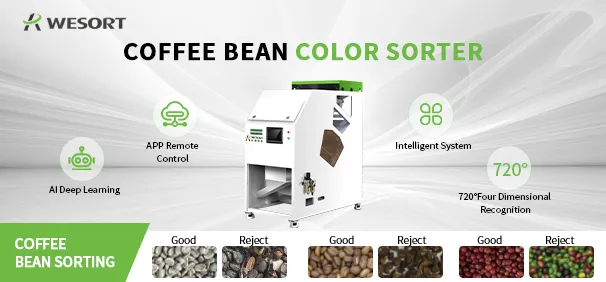
Coffee Bean Color Sorter is a machine that uses cameras and sensors to detect the color of coffee beans. The coffee beans are then sorted according to their color.
This is done by using a combination of light sources, optical filters, and image processing algorithms.
The light source illuminates the coffee beans and the optical filter allows only certain wavelengths of light to pass through.
This filtered light is then detected by an array of cameras which capture images of the coffee beans.
These images are then processed by an algorithm which determines the color of the coffee beans and sorts it accordingly.
1. Removing foreign materials and protecting equipment
Our coffee bean sorters eject foreign materials such as sticks and stones, extending the grinder lifespan and protect other downstream equipment.
2. Sorting green and roasted beans
WESORT's coffee bean sorting machines detect and eject beans with discoloration, mold, and insect bites, as well as unripened Quakers that won't brown. Arabica and Robusta
3. Arabica and Robusta
WESORT's machines sort accurately and maximize yields whether the beans are Arabica or the less homogeneous Robusta species.
4. Dependable in tough conditions
Our coffee bean sorters perform well, minimizing false rejects and rework, and maximizing yields, even in very dusty environments.
Do you want to improve the coffee quality by coffee bean sorting machine?
Don’t miss using this high-tech intelligent coffee bean sorting machine to improve the quality of your coffee beans, achieve perfect quality control with less effort, and ultra-high consistency.
Our industry-leading technologies in optical sorting achieve extremely low false reject rates, reducing rework, and optimizing yields.
At WEOSRT, we’ve been designing color sorter to support global specialty coffee since 2014.
WESORT coffee bean color sorter can provide models with different production capacities for small, medium and even large roasters and processing plants. After loading beans into the color sorter machine, roasters can easily navigate its user-friendly interface and smart operation features.
Get in touch
Our automation works smarter, wastes less, and optimizes your lines to ensure quality is consistent and potential recalls are thing of the past.
Speak with us to learn how you can make Every Resource Count!
Minimizing defects in green and roasted coffee is crucial for specialty coffee roasters. This is because the Specialty Coffee Association’s green coffee standards state that defective coffee is by its nature not specialty.
For a coffee to even be considered specialty grade, the green must have zero primary defects and five or [fewer] secondary defects per 350 grams,Defects such as quakers and scorched or tipped beans can negatively affect the overall flavor experience.
While you can manually sort coffee beans, color sorter machines are both more consistent and quicker. This means they streamline roastery operations – which is more important than ever against a backdrop of rising coffee prices.
Our best-in-class technology sorts and grades green and roasted coffee beans with unrivaled accuracy. As well as removing foreign materials, our coffee bean sorters eject imperfect beans while minimizing waste of those that are good - so you can maximize yields, prevent recalls, and keep customers happy.

Coffee Bean Color Sorter is a machine that uses cameras and sensors to detect the color of coffee beans. The coffee beans are then sorted according to their color.
This is done by using a combination of light sources, optical filters, and image processing algorithms.
The light source illuminates the coffee beans and the optical filter allows only certain wavelengths of light to pass through.
This filtered light is then detected by an array of cameras which capture images of the coffee beans.
These images are then processed by an algorithm which determines the color of the coffee beans and sorts it accordingly.
1. Removing foreign materials and protecting equipment
Our coffee bean sorters eject foreign materials such as sticks and stones, extending the grinder lifespan and protect other downstream equipment.
2. Sorting green and roasted beans
WESORT's coffee bean sorting machines detect and eject beans with discoloration, mold, and insect bites, as well as unripened Quakers that won't brown. Arabica and Robusta
3. Arabica and Robusta
WESORT's machines sort accurately and maximize yields whether the beans are Arabica or the less homogeneous Robusta species.
4. Dependable in tough conditions
Our coffee bean sorters perform well, minimizing false rejects and rework, and maximizing yields, even in very dusty environments.
Do you want to improve the coffee quality by coffee bean sorting machine?
Don’t miss using this high-tech intelligent coffee bean sorting machine to improve the quality of your coffee beans, achieve perfect quality control with less effort, and ultra-high consistency.
Our industry-leading technologies in optical sorting achieve extremely low false reject rates, reducing rework, and optimizing yields.
At WEOSRT, we’ve been designing color sorter to support global specialty coffee since 2014.
WESORT coffee bean color sorter can provide models with different production capacities for small, medium and even large roasters and processing plants. After loading beans into the color sorter machine, roasters can easily navigate its user-friendly interface and smart operation features.
Get in touch
Our automation works smarter, wastes less, and optimizes your lines to ensure quality is consistent and potential recalls are thing of the past.
Speak with us to learn how you can make Every Resource Count!

In modern agriculture, food processing, and recycling, quality control plays a vital role. This is where an optical sorter comes in. Many buyers often ask: What is an optical sorter? What does it do? How much does it cost? And how is WESORT optical...
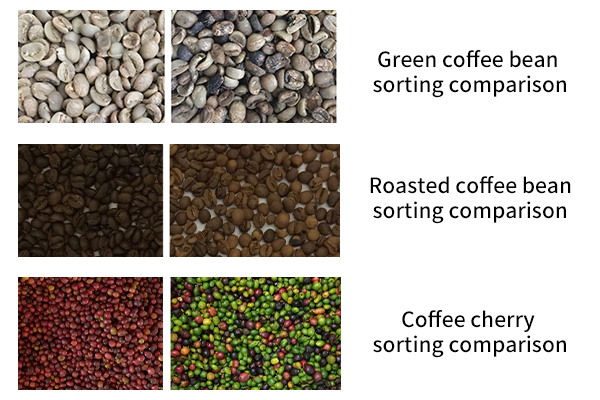
In the coffee industry, the quality of the final cup often depends on the smallest details during processing. One crucial step is removing defective beans, foreign materials, and color inconsistencies. This is where a coffee bean color sorter plays...

Coffee processing is a complex and meticulous task that involves several stages to transform raw coffee cherries into the high-quality beans we enjoy in our morning brew. One crucial step in this process is the sorting of coffee beans based on thei...

In the world of walnut processing, even the smallest imperfection can significantly impact product quality, market price, and brand reputation. Mold, insect damage, broken pieces, or inconsistent color are common defects that reduce the value of wa...
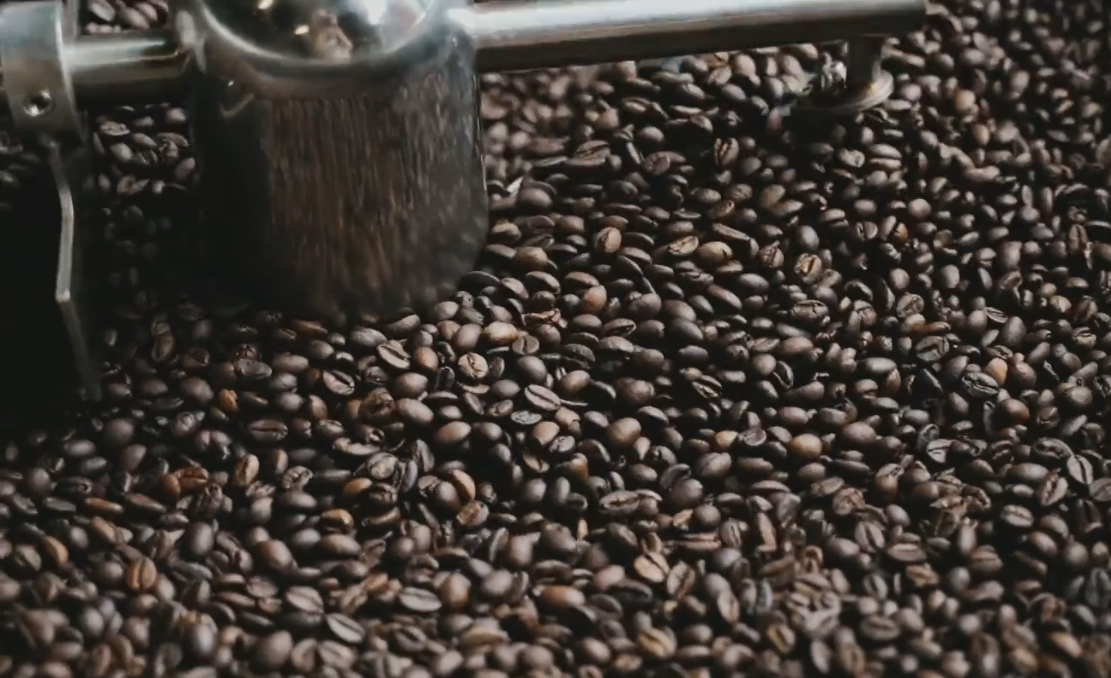
From green bean exporters to specialty coffee roasters, every producer faces the same challenge: how to remove defects efficiently while protecting valuable beans. Problems such as mold, fermentation damage, insect bites, black beans, broken beans,...
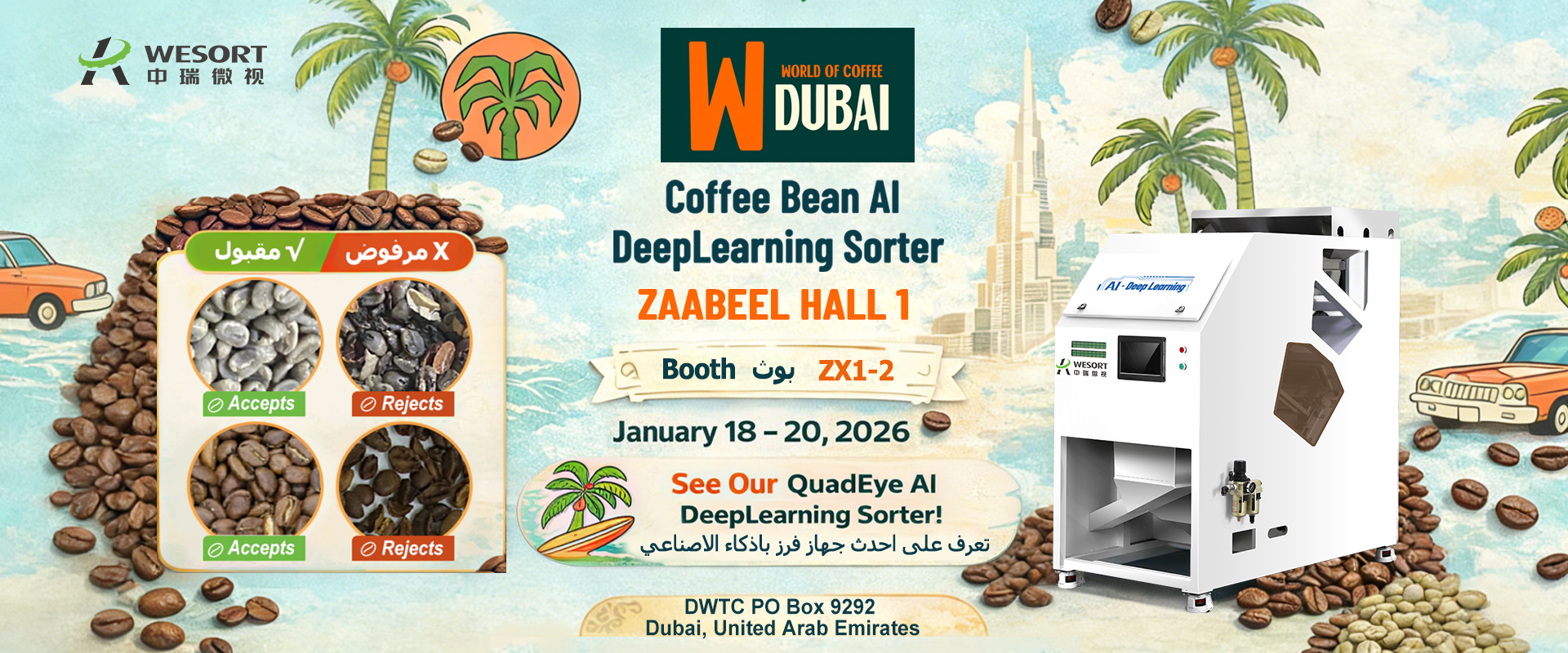
To meet the growing demand for premium and specialty coffee, sorting accuracy must go beyond traditional color-based systems. The QuadEye 360 AI Coffee Bean Sorter, developed by WESORT, represents the next generation of intelligent coffee bean so...

Dear friend, If you are attending World of Coffee Dubai 2026. we would like to invite you to visit WESORT. We will showcase our QuadEye 360 AI Coffee Bean Sorter, featuring 360° four-side inspection, AI deep learning models, near-zero breakage,...

Meta Description: Looking for the top hazelnut sorting machine manufacturer? WESORT offers advanced hazelnut color sorters with AI deep learning to efficiently remove defects, pests, and foreign materials. Boost your hazelnut processing efficienc...
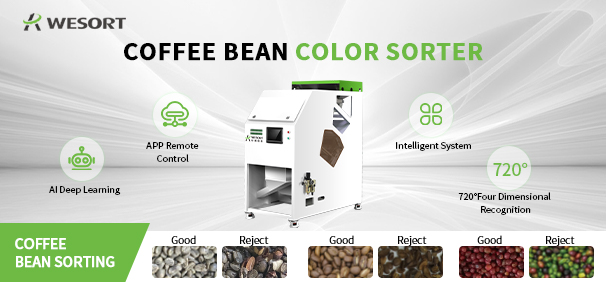
With the growing popularity of specialty coffee, the purity of coffee beans determines the aroma and taste of a cup of coffee. Achieving 99.9% purity requires high-performance coffee bean sorting equipment. Among Chinese coffee bean color sorter ma...
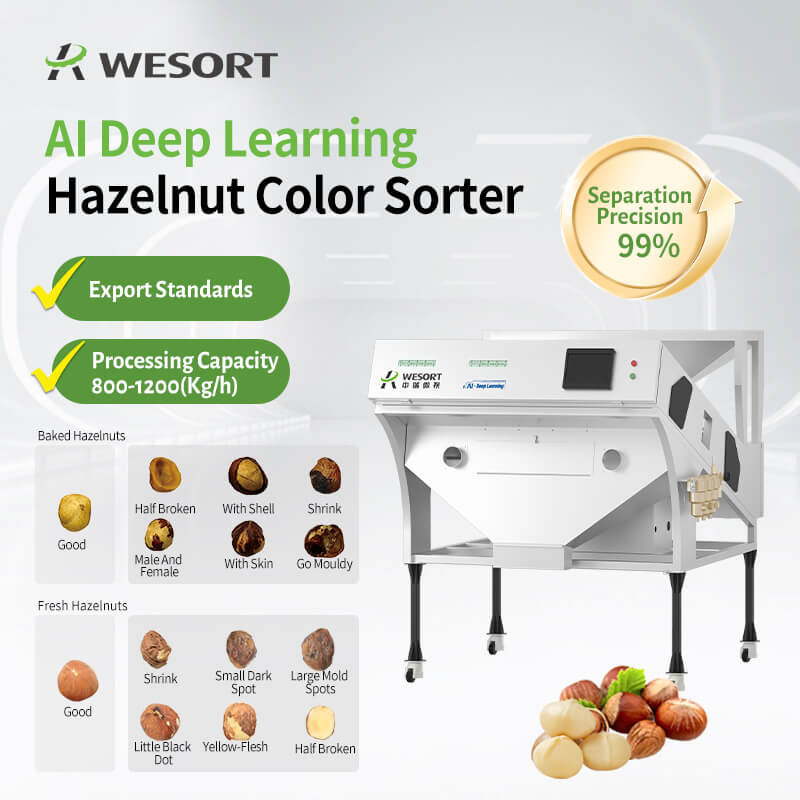
What's the most vexing issue in the hazelnut industry chain? It's not yield, but quality. Defects like mold, wrinkled skin, and foreign matter not only reduce product value but can also put export orders at risk. The solution isn't to increase the ...
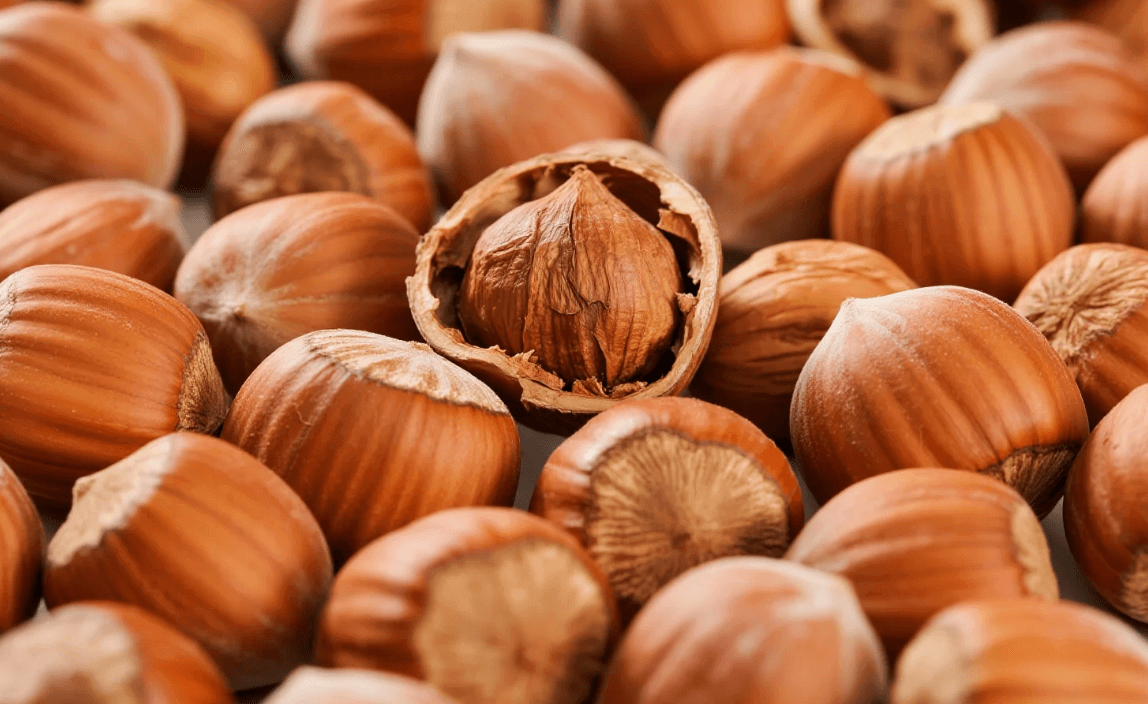
Every hazelnut tells a story—about the soil it grew in, the care during harvest, and the precision of its processing. Yet between farm and final product, hidden defects like mold, insect damage, and discoloration can turn premium hazelnuts into cos...
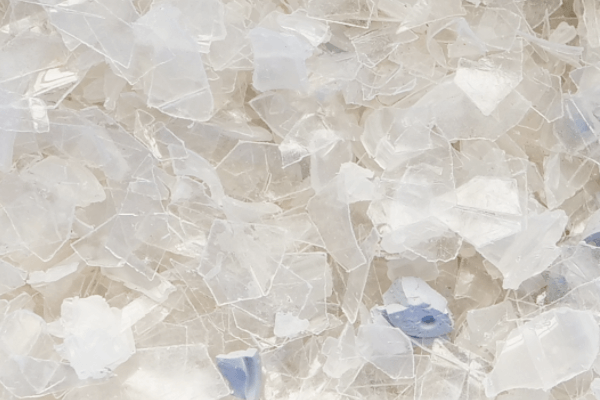
Plastic waste recycling is one of the most pressing challenges in today’s sustainability-driven world. Proper plastic sorting ensures high-quality recycled materials, reduces environmental impact, and improves profitability for recycling businesses...
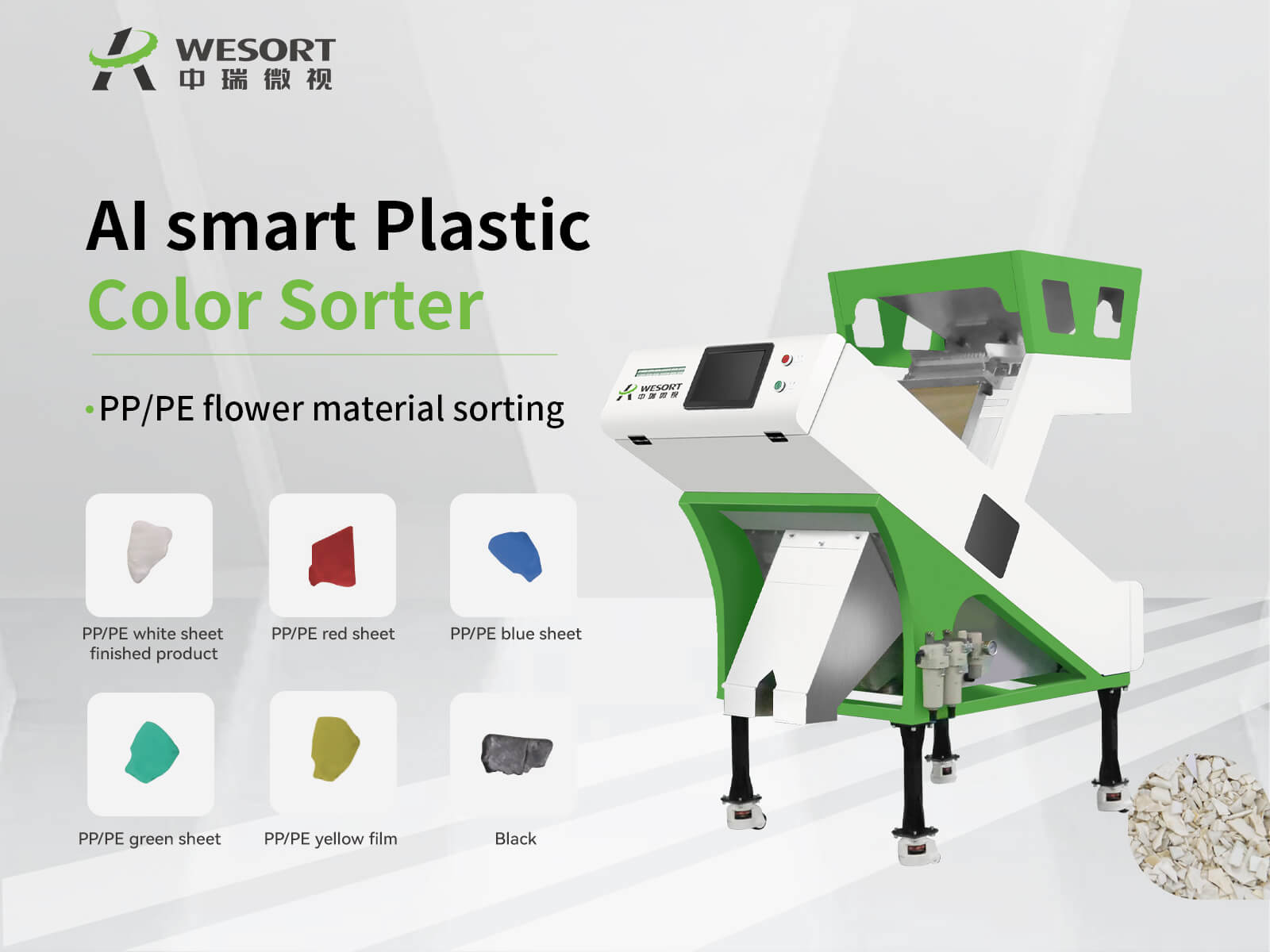
In the plastic recycling industry, purity and efficiency directly determine profitability. As global demand for recycled plastics increases, manufacturers need advanced solutions to separate impurities, improve yield, and ensure consistent product ...

In Mexico, coffee is more than just a drink — it’s a culture, a tradition, and a vital industry. Yet, challenges like impurities, pest damage, and uneven coloration often diminish the value of even the most carefully cultivated beans. At EXPO CAFÉ...
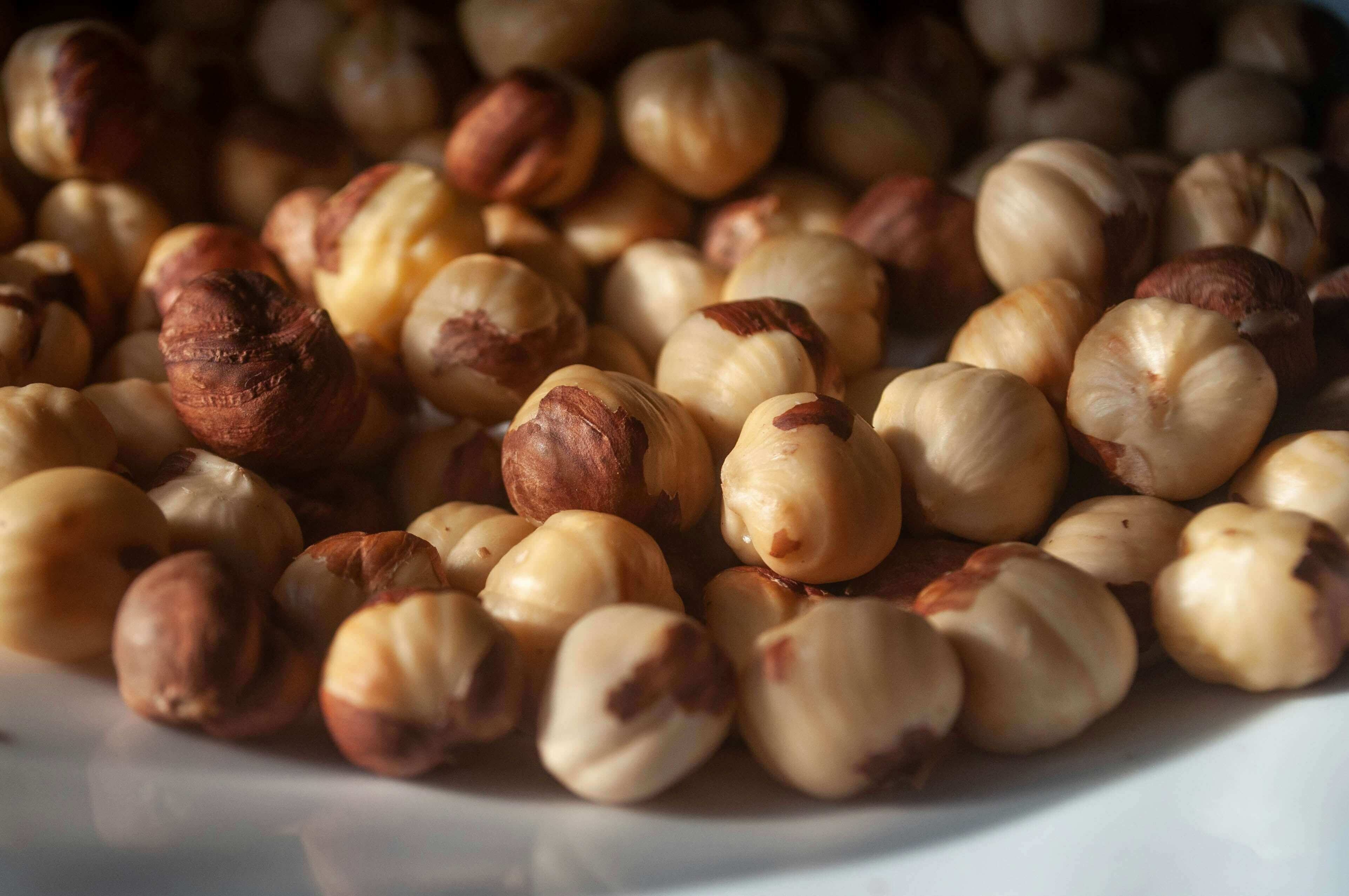
The global demand for hazelnuts continues to rise, driven by the growth of confectionery, bakery, and healthy snack markets. As consumption increases, so does the importance of quality control. Hazelnut processors face mounting pressure to deliver ...
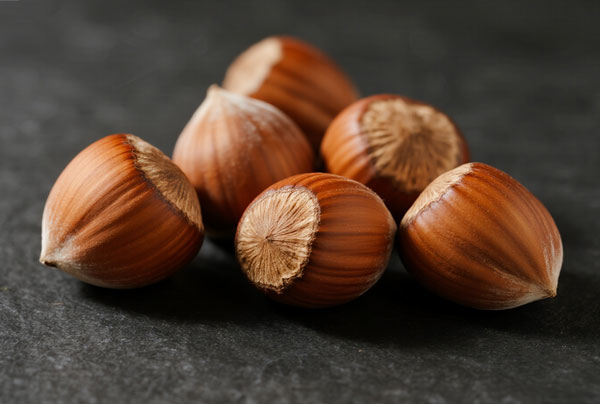
Hazelnuts are widely used in confectionery, bakery, and snacks, where product quality directly affects market value. However, hazelnut processing often faces serious challenges, such as pest infestation, seasonal labor shortages, and inconsistent m...
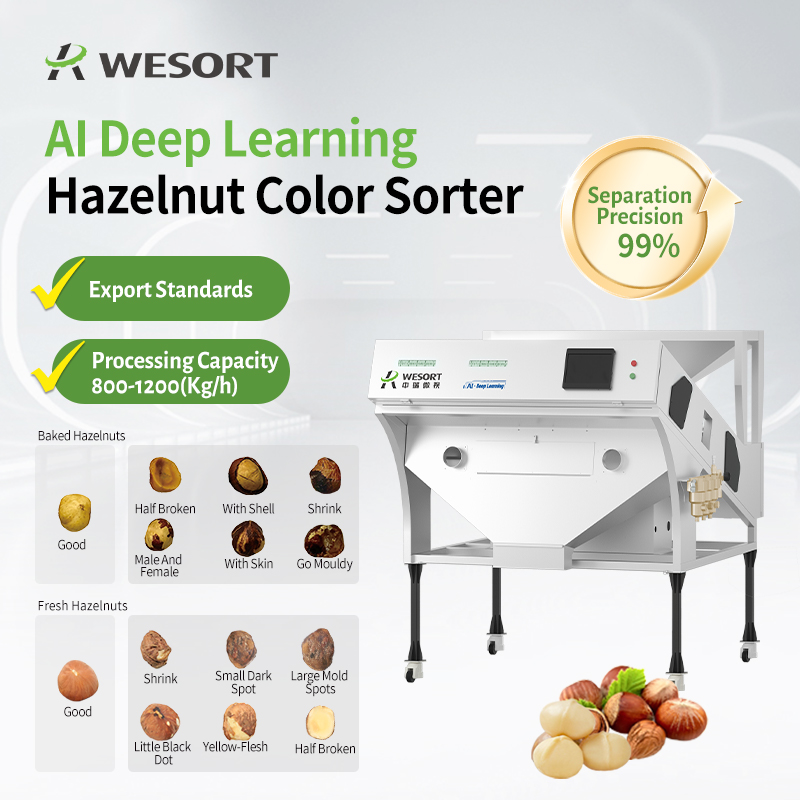
Hazelnut is the nut of the hazel and therefore includes any of the nuts deriving from species of the genus Corylus, especially the nuts of the species Corylus avellana. It is also known as cobnut or filbert nut according to species. A cob is roughl...
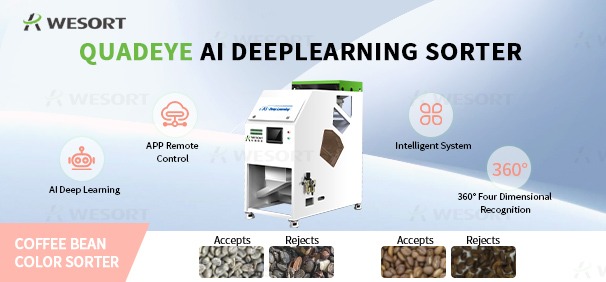
When you enjoy a smooth cup of coffee, you may not realize how much work goes into ensuring its purity and flavor. From harvest to cup, every step matters—and one of the most critical yet often overlooked stages is coffee bean sorting. Common Cof...
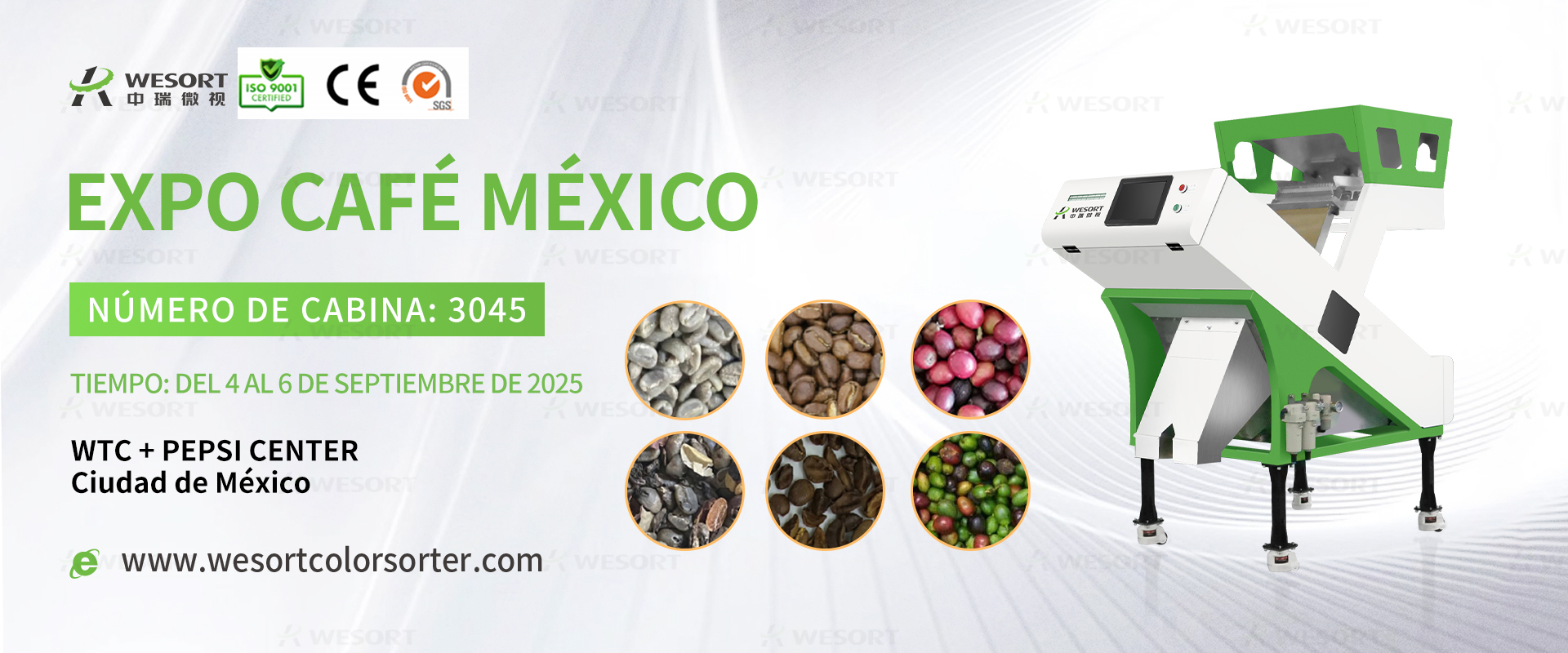
Dear Coffee Industry Partners, The Mexican Coffee Shop Expo 2025 is just around the corner—and WESORT , a leader in intelligent sorting technology, will be there to showcase our core solution for coffee processors: Coffee Bean Color Sorters. Mark...
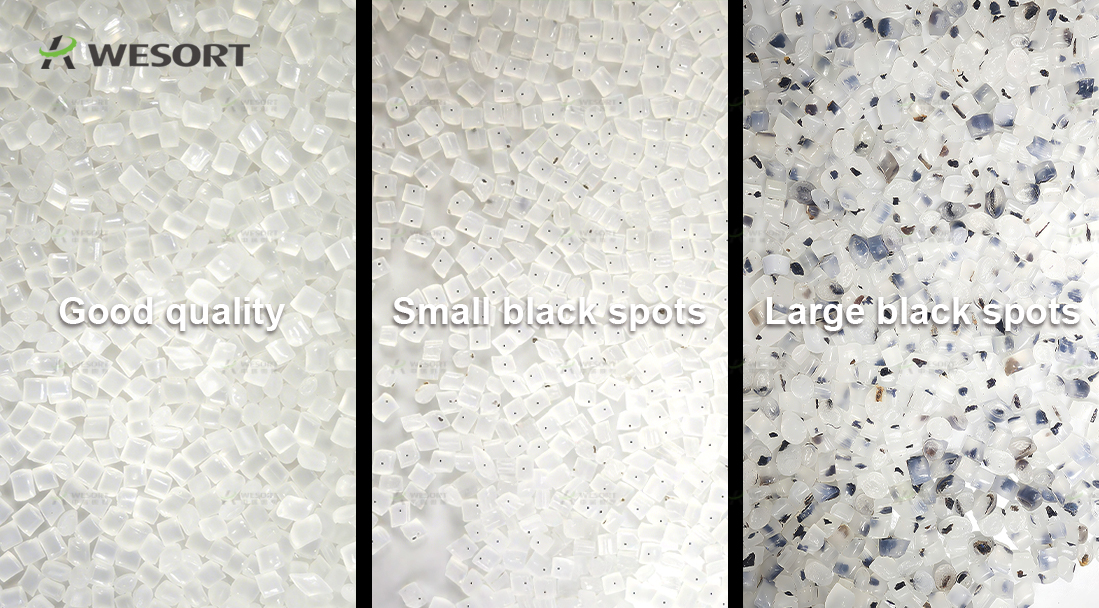
In the plastic pellet production process, color purity often directly determines the product's selling price and market competitiveness. Especially for transparent, white, or light-colored plastic pellets, even tiny black specks can affect the appe...

In modern agriculture, food processing, and recycling, quality control plays a vital role. This is where an optical sorter comes in. Many buyers often ask: What is an optical sorter? What does it do? How much does it cost? And how is WESORT optical...

In the coffee industry, the quality of the final cup often depends on the smallest details during processing. One crucial step is removing defective beans, foreign materials, and color inconsistencies. This is where a coffee bean color sorter plays...

Coffee processing is a complex and meticulous task that involves several stages to transform raw coffee cherries into the high-quality beans we enjoy in our morning brew. One crucial step in this process is the sorting of coffee beans based on thei...

In the world of walnut processing, even the smallest imperfection can significantly impact product quality, market price, and brand reputation. Mold, insect damage, broken pieces, or inconsistent color are common defects that reduce the value of wa...

From green bean exporters to specialty coffee roasters, every producer faces the same challenge: how to remove defects efficiently while protecting valuable beans. Problems such as mold, fermentation damage, insect bites, black beans, broken beans,...

To meet the growing demand for premium and specialty coffee, sorting accuracy must go beyond traditional color-based systems. The QuadEye 360 AI Coffee Bean Sorter, developed by WESORT, represents the next generation of intelligent coffee bean so...

Dear friend, If you are attending World of Coffee Dubai 2026. we would like to invite you to visit WESORT. We will showcase our QuadEye 360 AI Coffee Bean Sorter, featuring 360° four-side inspection, AI deep learning models, near-zero breakage,...

Meta Description: Looking for the top hazelnut sorting machine manufacturer? WESORT offers advanced hazelnut color sorters with AI deep learning to efficiently remove defects, pests, and foreign materials. Boost your hazelnut processing efficienc...